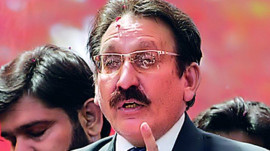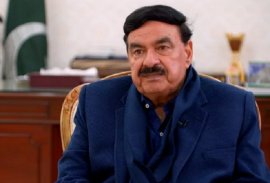
While the additional attorney-general, KK Agha, was arguing on the formation of the judicial commission, the bench observed that four senior judges of the BHC, excluding the chief justice, are due to retire within three weeks. And in a situation when there would be no senior judge available how the commission would be formed to make appointments.
Agha didn’t have a satisfactory answer. The chief justice then directed him to seek instructions from the prime minister and inform the court.
Earlier in the morning the AAG, while resuming his formulations on Article 175-A of 18th constitutional amendment before a 17-member larger bench, headed by Justice Chaudhry, submitted that under the Constitution every law is amendable and such amendments can be made within the ambit of the Constitution.
The apex court bench has been hearing several identical petitions challenging certain clauses of the 18th amendment. “We are an independent nation and an Islamic country, we cannot go beyond the Constitution. Independence of the judiciary is an important point in the Objective Resolution which is part of the Constitution,” observed the chief justice.
Justice Tassaduq Jilani enquired whether the basic structure of the Constitution is amendable. Agha replied in the negative. However, he said that in the Zafar Ali Shah case the Supreme Court had allowed a dictator to amend the Constitution despite the fact that there was no parliament but now there is a parliament and it has powers to amend the Constitution.
“We are talking about the real Constitution, Article 2A was present in the 1973 Constitution,” the chief justice observed. “Forget the past, tell us about the real constitution, whether parliament has powers to bring changes in the basic structure of the Constitution” Justice Ramday asked.
“Can anyone say that the judiciary is not independent, we just want to ensure its independence and the same has been done in the Raza Rabbani report, we all are trying to ensure independence of the judiciary” Justice Chaudhry observed.
Justice Javed Iqbal asked the AAG if parliament can pass a resolution which is contrary to the aspirations of people. To this, Agha said parliament comprises elected representatives of the people.
The chief justice observed that an attempt was made to run the country through the presidential system because one man had all powers. However, the attempt failed and now there is parliamentary system in the country.
While presenting his formulation on the appointment of judges, Agha submitted that if Article 175-A is not impinged on any other article or provision of the constitution, then it should stay. To a query of the bench, he said Article 175-3 deals with the separation of powers doctrine and it has nothing to do with the procedure of judges’ appointment.
Justice Chaudhry asked him to cite examples from any other country except for the US where in the appointment of judges the judiciary and the executive are involved together.
Agha quoted the British system and claimed that the Lord Chancellor is the final authority in the appointment of judges.
The court observed that Lord Chancellor was not the final authority. The bench also observed that the role of the executive in the appointment of judges in Britain has gradually narrowed down while in Pakistan it is being enhanced.
“We should be realistic that our background is different from the UK, one should realise that the culture and ground realities of the two counties are different, here Patwaris and SHOs are appointed solely on a political basis,” Justice Rabbani observed.
Justice Saqib Nisar observed that civil servants and parliamentarians are strictly prohibited in Britain’s judicial commission from playing a role in the appointment of judges.
The chief justice asked the AAG about the objectives of the separation of powers doctrine. And what the Constitution wants to ensure. Agha said it was for independence of the judiciary, adding that through Article 175-A the government has ensured independence of the judiciary. Justice Asif Khosa observed that separation means judicial functions should be separated from the executive while the process of consultation in appointment is not part of it.
The court observed that after November 3, 2007 many changes have occurred in the judicial system while such changes were ignored in the 18th amendment.
Agha conceded that Article 175-A is a new system of appointing superior judges but he could not define the status of the parliamentary committee for the appointment of judges. Justice Tariq observed that under Article 239 and its clauses 5 & 6 any constitutional provision could be challenged in the court of law.
Published in The Express Tribune, August 11th, 2010.













































COMMENTS (2)
Comments are moderated and generally will be posted if they are on-topic and not abusive.
For more information, please see our Comments FAQ